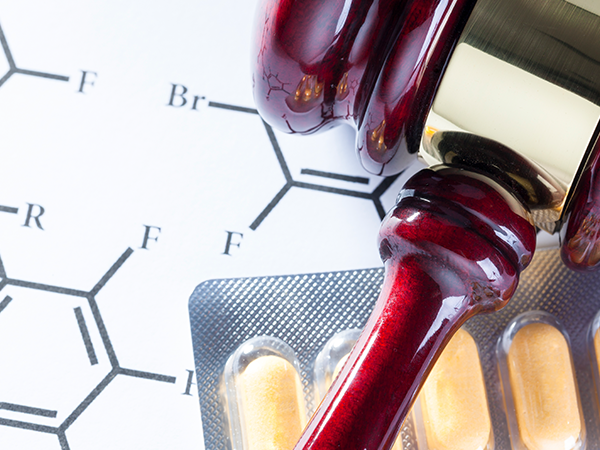
Teva Pharmaceuticals v Eli Lilly
TEVA PHARMACEUTICALS INTERNATIONAL GMBH, Appellant, v. ELI LILLY AND COMPANY, Appellee
ANDREW HIRSHFELD, PERFORMING THE FUNCTIONS AND DUTIES OF THE UNDER SECRETARY OF COMMERCE FOR INTELLECTUAL PROPERTY AND DIRECTOR OF THE UNITED STATES PATENT AND TRADEMARK OFFICE, Intervenor 2020-1747, 2020-1748, 2020-1750 Appeals from the United States Patent and Trademark Office, Patent Trial and Appeal Board in Nos. IPR2018- 01422, IPR2018-01423, IPR2018-01425. Decided: August 16, 2021
Teva Pharmaceuticals International GmbH (“Teva”) appealed from a final written decision of the U.S. Patent and Trademark Office (“PTO”) Patent Trial and Appeal Board (“Board”) holding that the claims of three U.S. Patents are unpatentable as obvious over the cited prior art. The Federal Circuit affirmed.
Teva proposed that the Court first decide the merits of the appeal, and if not reversed or remanded, then the Court would issue a limited remand under Arthrex. The Court rejected Teva’s proposal. Teva then waived its right to a limited remand to seek rehearing by the Director.
Lilly asserted that a skilled artisan would have been motivated to combine the teachings of the references to make a humanized anti-CGRP monoclonal antibody for therapeutic use in humans. Teva argued that the Board considered whether a skilled artisan would have been motivated to make an antibody merely to study or use it. Therefore, according to Teva, the Board incorrectly discounted important safety and efficacy concerns when used for treating human disease.
The Court stated that “[c]ommon sense and scientific reality dictate that scientists do not ‘study or use’ humanized anti- bodies with an end goal of treating diseases in test tubes or in rats.” The Court indicated that “the question before the Board was whether a skilled artisan at the time of the invention would have been motivated to make the claimed humanized antibodies, not whether a skilled artisan would have been motivated to use those antibodies to treat human disease.” The Court found that the Board’s review of the evidence was sufficient to support the conclusion that one skilled in the art would not be discouraged from making the claimed antibody.
Teva disagreed with the Board’s interpretations of the references that purported to support a finding of obviousness. The Court noted that where there are competing interpretations of evidence, the Board’s decision to support one interpretation over another must be sustained upon review for substantial evidence. The Court refused to displace the Board’s “reasonable interpretation” of the references.
Teva also argued that secondary consideration of nonobviousness were present. Teva asserted that its products based on the claimed invention had received industry-wide acclaim, satisfied a long-felt need, achieved unexpected results, faced industry skepticism, and achieved commercial success Teva also pointed to a patent license it granted.
The Court examined the requirement of a nexus between the claimed invention and the evidence of secondary considerations. The Court noted that “the degree of correspondence between a product and a patent claim falls along a spectrum” ranging from “perfect or near perfect correspondence” to “no or very little correspondence.” Perfect correspondence is not required, but the patentee must “demonstrate that the product is essentially the claimed invention.”
The Board incorrectly concluded that “in order to defeat a presumption of nexus, a patent challenger need only show that an ‘unclaimed feature materially affects the functioning of the product that is alleged to be coextensive with the claim.’” The Court agreed with Teva that “under such a rule the presumption of nexus would rarely, if ever, attach because virtually every innovative product inevitably has some unclaimed feature that materially affects its functionality.”
However, the Court noted that the claims had a broad scope and a lack of structural limitations. The Board found that the claims did not recite amino acid sequences, whereas the Teva products had “specific sequences that critically affect binding affinity and inhibit the ability of the antibodies to kill cells.” Teva’s reliance on the presumption of a nexus was its sole basis for its assertion of nexus. The Court therefore concluded that “there is no nexus between the challenged claims and the secondary considerations.”
With regard to the license, the Court noted that where an independent party chooses to respect the patent and pay a royalty rather than litigate and attempt to invalidate the patent, there is support for a finding of validity. However, in this case, 188 patents were licensed, and not just the three patents in suit. Therefore “the nexus between the license and the validity of any particular claim is rather tenuous.”
Read more: Federal Bar member attorneys may access the full case summary by registered patent attorney B.C. “Bill” Killough in the September 2021 issue of Federal Circuit Case Digest.
 B.C. Killough is a registered patent attorney based in Charleston, SC. On behalf of his clients, Bill has obtained more than 300 United States patents, participated in prosecuting more than 100 foreign patent applications and he has filed more than 1000 trademark applications with the US Patent and Trademark Offices.
B.C. Killough is a registered patent attorney based in Charleston, SC. On behalf of his clients, Bill has obtained more than 300 United States patents, participated in prosecuting more than 100 foreign patent applications and he has filed more than 1000 trademark applications with the US Patent and Trademark Offices.
Additionally, you may read the full opinion here.